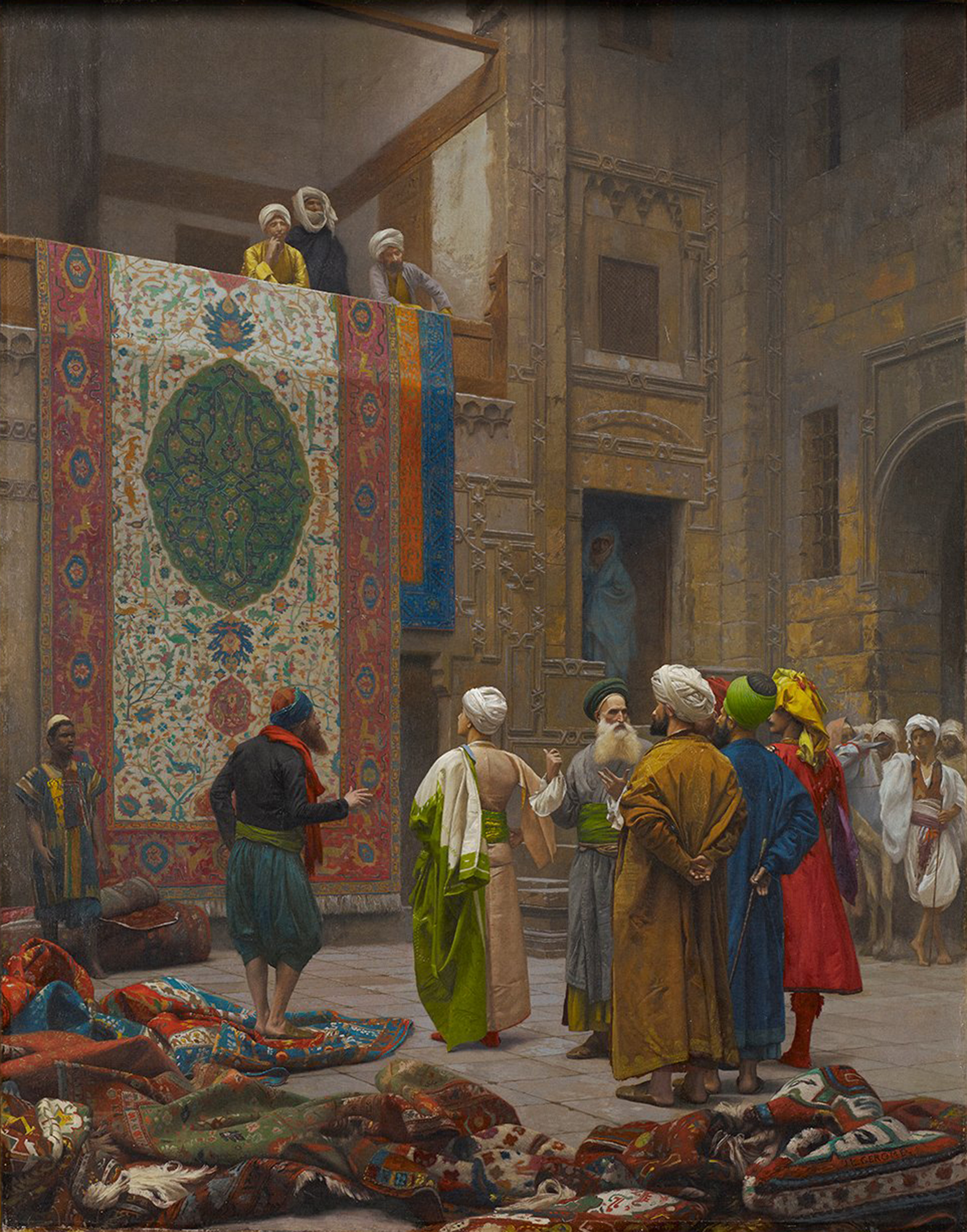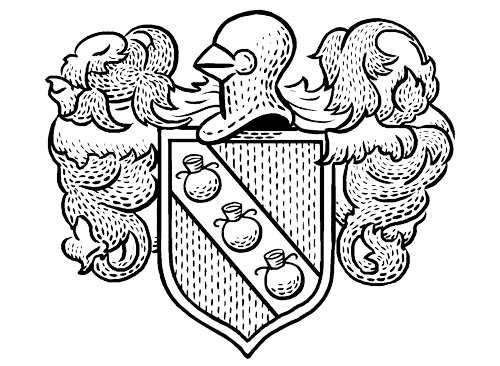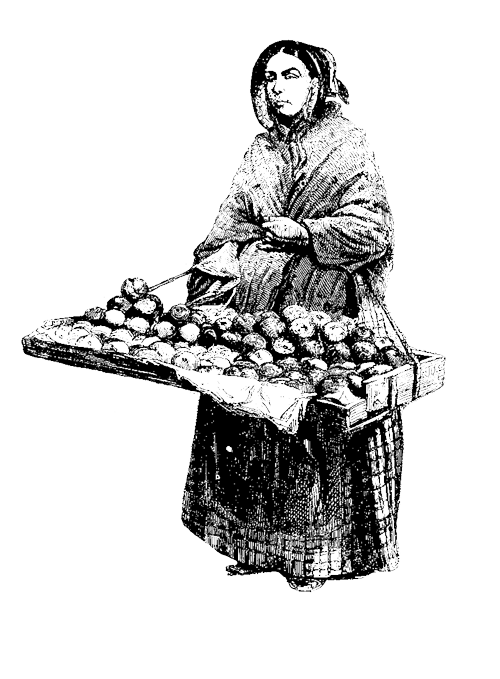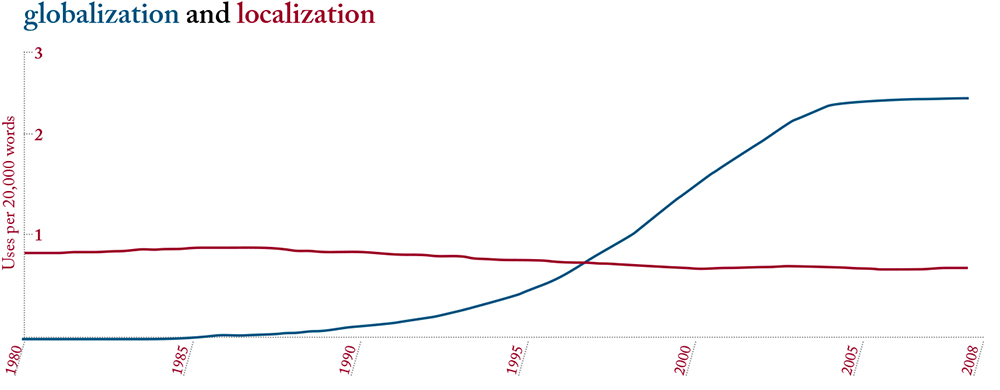
The Carpet Merchant, by Jean-Léon Gérôme, c. 1887. The Minneapolis Institute of Art, The William Hood Dunwoody Fund.
admirabile commercium: Latin for “wondrous exchange,” viz., between heaven and earth in Christian theology. “Let us seek to be like Christ, because Christ also became like us: to become gods through him, since he himself, through us, became a man.”—St. Gregory of Nazianzus
algo-trading: A process of using computers programmed to follow algorithms for placing trades in order to generate profits at a speed and frequency unattainable for a human trader.
arbitrage: Traffic in stocks that seeks to take advantage of differences in price for the same stock quoted at the same time between exchange markets in distant places.
bargain: To agree to terms asked and offered; to come to terms; to stipulate. From late Latin barcāneāre, which according to philologist Friedrich Christian Diez refers to barca, a bark or barge that carries goods back and forth.
barter: To exchange, to cheat, to deceive. From Italian barattare, to swap.
bazaar: A marketplace or permanent market, usually one consisting of shops or stalls, where merchandise is offered for sale. From Persian bāzār, market. The word has also been adopted in Hindi and Turkish and seems to have come into English from the latter, through Italian bazarra, the Genoese word for marketplace.
billingsgate: Scurrilous language; violent abuse. After the London fish market, known for the vituperation of its fishmongers. “You’ll see a draggled damsel here and there / From Billingsgate her fishy traffic bear.”—John Gay, Trivia: or, The Art of Walking the Streets of London (1716)

bourse
A meeting place of merchants for the transaction of business; an exchange. Some say the word arose at Brugge, from the sign of a purse, or three purses, displayed on a house bought by merchants to meet in; the symbol was thought to be the arms of the former owners, the family Bursa or de la Bourse. Others place the origin at Antwerp.
broker: A retailer of commodities; a secondhand dealer. From Old French brochier, to broach or tap a cask. The brocheor, brokeor, or broker was a tapster, who retailed wine “from the tap.” Hence, by extension, any retail dealer who bought to resell, or who bought for another, e.g., a jobber, middleman, or agent.
burden: A volumetric measure of cargo capacity. Superseded by “builder’s old measurement,” a formula used in England between 1773 and 1872 to calculate the tonnage of a ship.
commerce: “A kind of transaction in which A plunders from B the goods of C, and for compensation B picks the pocket of D of money belonging to E.”—Ambrose Bierce, The Devil’s Dictionary (1911)

costermonger
Originally, an apple seller, esp. one who sells fruit in the open street. In later use, a person who sells fruit, vegetables, fish, etc., in the street from a barrow or handcart. Also, a term of contempt or abuse. “Virtue is of so little regard in these / costermonger times that true valor is turned / bear-herd.”—Henry IV, Pt. 2
dead-cat bounce: A pattern wherein a sharp decline in the price of a share of stock is immediately followed by a moderate rise before resuming its downward movement.
duff: To sell or peddle under the pretense of offering something valuable that has been smuggled or stolen.
entrepôt: A port to which goods are brought for import and export, and for collection and distribution, esp. one where goods are exempt from particular customs duties; a center of commerce.
exchange: The action, or act, of reciprocal giving and receiving. The proverb “Fair exchange is no robbery” appears as “Though change be no robbery for the changed case” in John Heywood’s Dialogue of the Effectual Proverbs of the English Tongue Concerning Marriage (1546).
feudalism: The system of polity that prevailed in Europe during the Middle Ages, based on the relation of superior and vassal arising out of the holding of lands in feud. Adam Smith claims the feudal system was destroyed by “the silent and insensible operation of foreign commerce and manufactures.” First use in English, 1839.
flea market: (colloq.) A term applied jocularly to a street market. From French marché aux puces, a market in Paris.
free trade: (hist.) Trade that unlawfully seeks to avoid paying customs duties; smuggling.
hawker: A person who goes from place to place selling goods, or who cries them in the street. Apparently from Middle Low German hoker, Dutch heuker, higgler, hawker, huckster; the Low German höker (one who carries a pack or load on his or her back, one who sits at a stall) derives from hocken, to take upon the back.
jobber: A wholesale dealer or principal on a stock exchange who buys and sells stocks for his or her own account. Jobbers deal only with brokers instead of directly with the public.

market fresh: Tipsy, having had a few drinks; the dubious degree of sobriety with which farmers would return home from market.
mercantilism: An economic theory common in Europe from the 16th to 18th cent. that promoted government regulation of a nation’s economy for the purpose of augmenting state power at the expense of rival nations.
merchant: A person who purchases and sells goods or commodities for profit. Originally, used of any trader in goods not manufactured or produced by his or her own hand. Thus, to have merchant’s ears, to pretend not to hear.
naked writer: A seller of call and put options who does not maintain an offsetting long or short position in the underlying security.
one belt, one road: 一帶一路.The Chinese government’s 2013 initiative to develop overland and sea trade routes between Asia, Africa, and Europe.
pazar: ݒاازار. Ottoman Turkish for both “market” and “Sunday.” From Persian, bāzār, bazaar (q.v.).
pedder: A person who carries goods about for sale; a pedlar (q.v.). Of uncertain origin; perhaps from classical Latin pedārius, of lower rank.
pedlar: A person who engages with something in a cursory or ineffectual manner; a dabbler, a trifler.
plunger: A person who bets, gambles, or speculates, esp. rashly or recklessly.
quid pro quo: A thing given in exchange or return for another; tit for tat.
selling calico: To have one’s shirttail hanging out or showing through the seat of one’s pants.
supercargo: “An officer or person in a merchant’s ship whose business is to manage the sales and superintend all the commercial concerns of the voyage.”—Noah Webster’s American Dictionary of the English Language (1828)
trade: (colloq.) Those engaged in mercantile or commercial occupations (as opposed to practicing a learned profession, having a private income, etc.), viewed collectively or as a class. Often depreciative (e.g., “She married into trade”).
trading fours: ( jazz slang) A pattern in which musicians alternate soloing in four-bar segments; thus, to engage in pointless argument.
trademark: A scratch on the face, esp. among prostitutes.
traffic: To carry on trade, to trade, to buy and sell; to have commercial dealings with anyone; to bargain or deal for a commodity; to have dealings of an illicit or secret character; to deal, intrigue, conspire.
truck: The action or practice of trading by exchange of commodities; barter (q.v.).
wampum: Cylindrical beads made from shells threaded on strings, which served as currency for N. American Indians, both among themselves and in dealings with Europeans. From Algonquian dialects; first English usage, 1636.
Explore Trade, the Spring 2019 issue of Lapham’s Quarterly.